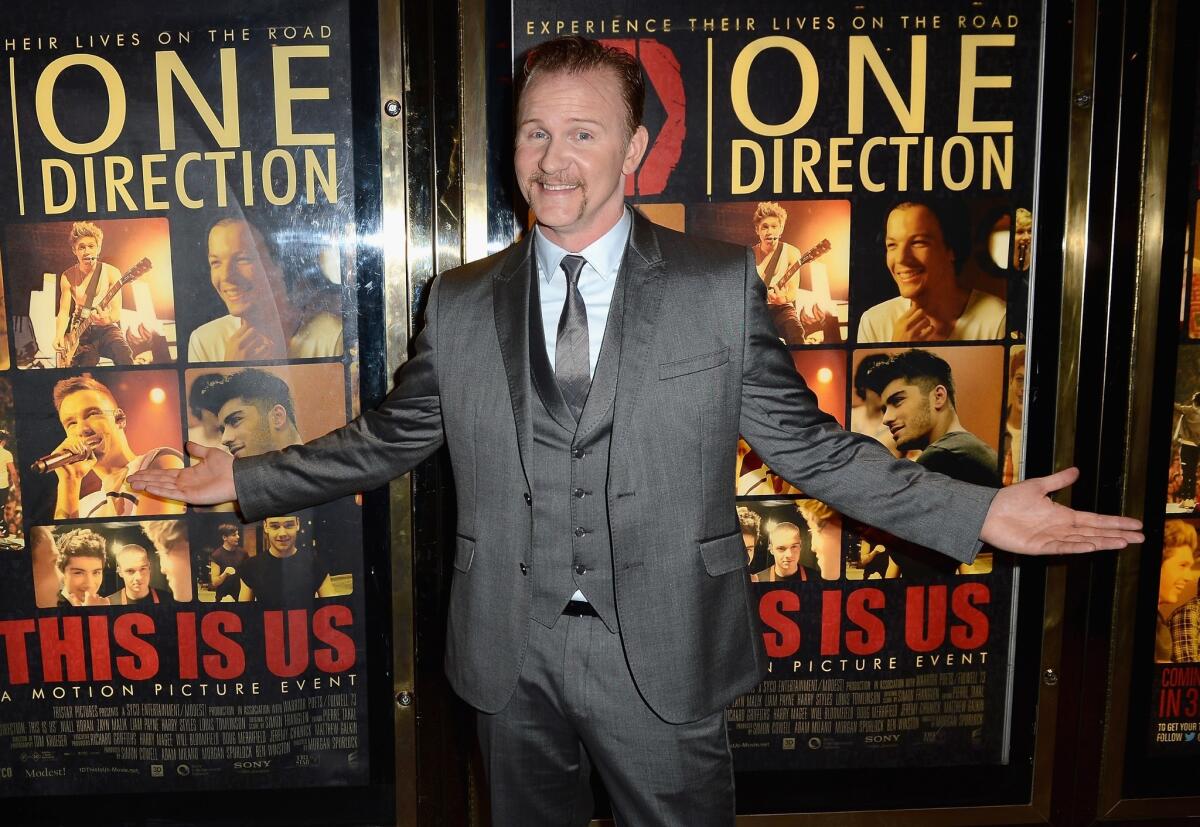Morgan Spurlock lauds Netflix’s deal for “The Square”

- Share via
Academy Award-nominated documentarian Morgan Spurlock had been making movies for more than a decade before one of his films finally reached a movie theater in his hometown of Parkersburg, W.Va.
The film, “One Direction: This Is Us,” was an unusual choice for the director of such acclaimed documentary films as “Super Size Me” and “The Greatest Movie Ever Sold.” But the youthful audience turned out in force to watch a movie chronicling the lives of the five-member British boy band. The film opened in nearly 3,000 theaters nationwide and brought in $67 million in global box-office proceeds.
That’s an anomaly in the world of documentary films, which rely on digital distributors like Netflix to reach audiences.
ON LOCATION: Where the cameras roll
“For years, Netflix has been a huge friend of documentary filmmakers,” Spurlock said. “I know more people who’ve consumed documentaries on Netflix than anywhere else.”
Though it has been distributing documentary films for years, the online movie and television service’s acquisition of “The Square” puts Netflix in a prestigious new category as an Oscar contender.
Spurlock said the deal for Jehane Noujaim‘s nonfiction feature film, which chronicles the protests in Cairo’s Tahrir Square, and the political upheaval that followed, shows that Netflix recognizes value in high-quality nonfiction projects.
“It’s something HBO has known for years,” Spurlock said.
PHOTOS: Behind the scenes of movies and TV
Spurlock said he’s not concerned that Netflix sought to control theatrical as well as digital distribution of “The Square.”
“It’s not like they’re just paying nickels,” he said. “They’re actually paying good money for movies -- especially movies where they want to have all the rights.”
Spurlock said he loves the communal experience of watching a movie in the theater. But he also recognizes that more people have seen his films via Netflix -- with the notable exception of “Super Size Me,” the 2004 documentary film that examined the influence of the fast-food industry and reached millions of viewers through the cable network MSNBC.
“First and foremost, as a filmmaker I make movies that I want people to consume and see,” Spurlock said.
PHOTOS: Celebrities by The Times
Digital distribution can come at a cost, Spurlock said.
Spurlock said the 2010 film “Freakonomics,” based on the bestselling book about human behavior, debuted on Apple Inc.’s iTunes before it reached theaters. Although it hit $1 million in sales through the online store, theatrical ticket sales reached a meager $32,000 on opening weekend.
“A lot of people said it’s because of the digital footprint: People who wanted to consume it already consumed that,” Spurlock said.
Some theater owners refuse to exhibit a movie that also is being offered digitally, Spurlock said.
“Somebody like me, who grows up in West Virginia, who loves these types of movies, where am I going to go?” Spurlock said. “Whether you see it on demand or on Netflix, you have a chance to see a movie that other people are talking about.”
ALSO:
Pandora listening hours remain strong against new iTunes Radio
21st Century Fox first-quarter income falls despite higher revenue
‘Call of Duty: Ghosts’ game reviews generally down from recent years
More to Read
From the Oscars to the Emmys.
Get the Envelope newsletter for exclusive awards season coverage, behind-the-scenes stories from the Envelope podcast and columnist Glenn Whipp’s must-read analysis.
You may occasionally receive promotional content from the Los Angeles Times.










